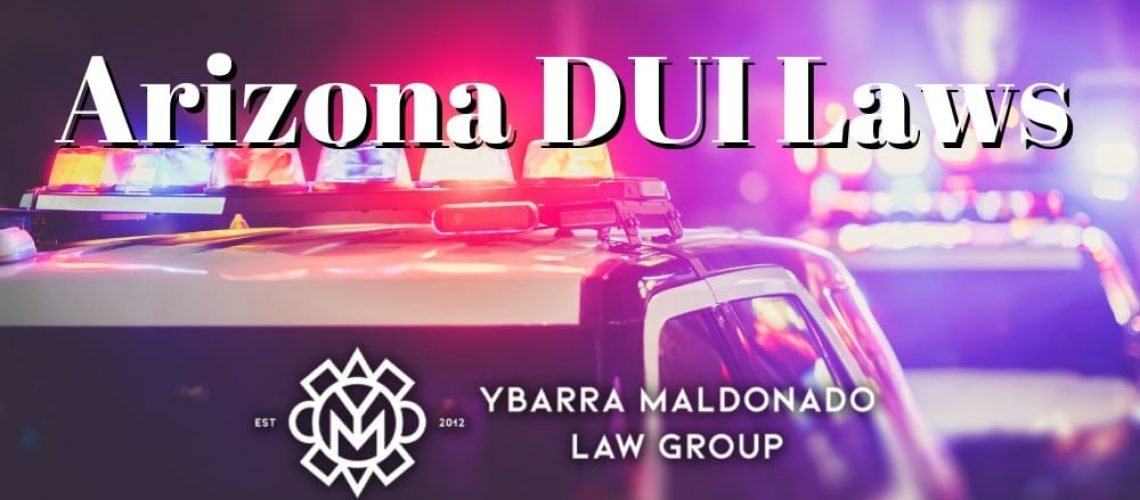In Arizona, the potential penalties associated with a DUI conviction are steep. That’s why it’s important to work with an attorney who has extensive experience with DUI cases. Your criminal defense attorney should know the ins and outs of Arizona law and be able to craft a strong, effective defense on your behalf. In this blog, we outline the important Arizona DUI laws to understand for your case.
At Ybarra Maldonado Law Group, our Phoenix criminal defense lawyers act as staunch advocates for our clients. We remain up to date on all changes to the Arizona Revised Statutes that could affect the cases that we handle. This way, we ensure that your defense is as strong as it can be. If you’re facing charges under Arizona’s DUI laws, our defense attorneys are here for you. To schedule a consultation with us, please call our office at 602-910-4040 today.
What Is a DUI Charge in Arizona?
In Arizona, you can receive DUI penalties if your Blood Alcohol Concentration (BAC) exceeds 0.08%. If you are a commercial driver, your BAC cannot exceed 0.04%. Those who are under 21 years of age cannot have a BAC above 0.00%. Additionally, the penalties are much harsher if the defendant’s BAC exceeds 0.15%.
So, in order to receive a charge for driving under the influence (DUI), you could either have a BAC above the legal limit, or you could already be impaired with a lower blood alcohol concentration. In other words, you can still be charged if your BAC is technically under the legal limit.
If you are drunk or drugged driving and impaired to even the slightest degree, you could face DUI penalties in Arizona.
Important DUI Laws in Arizona
There are a few important statutes to keep in mind when looking into Arizona DUI laws. We outline the specific laws from the Arizona Revised Statutes that involve driving under the influence of drugs or alcohol.
Misdemeanor DUI Violations
- ARS 4-244.34: It is illegal for anyone under 21 to drive with “spirituous liquor” in their body. They cannot have a BAC above 0.00%.
- ARS 28-1381: It is illegal to drive or to be in actual physical control of a motor vehicle while impaired to even the slightest degree by drugs or alcohol.
- It is also illegal to drive or be in actual physical control of a vehicle within two hours of having a blood alcohol content over the legal limit.
- ARS 28-1382: This section outlines the parameters for an extreme DUI charge.
- It also outlines the parameters for a super extreme DUI charge.
Felony DUI Violations
- ARS 28-1383: One can receive aggravated DUI charges if they violate ARS 28-1381 or ARS 28-1382 while their driver’s license is suspended, revoked, canceled, or refused. This also applies if the license has any restrictions placed on it.
- This section also outlines the penalties for committing a third or subsequent DUI offense within an 84-month period.
- One can also be charged with an aggravated DUI if they are drugged or drunk driving with someone under 15 years old in the vehicle.
- Lastly, you can be charged with an aggravated DUI if you drive under the influence while your vehicle has an ignition interlock device.
Penalties for DUI in Arizona
The penalties for DUI offenders are steep in Arizona. After any DUI arrest and conviction, you will likely need to install a certified ignition interlock device in your vehicle. You will also immediately lose your driving privileges if police officers find that you have committed a DUI offense. You can even lose your driving privileges for refusing to submit to a breath test or drug screening.
Depending on the severity of the offense, as well as any prior offenses, you may face a number of penalties for driving under the influence of drugs or intoxicating liquor.
Arizona First Offense DUI
A first-offense DUI is a class 1 misdemeanor in Arizona. This is the highest misdemeanor class before something becomes a felony offense. The DUI penalties for a first offense include no less than 10 consecutive days in jail, a fine of at least $1,250, a mandatory drug and alcohol screening, education courses, treatment (if applicable), an ignition interlock device, and community service.
Extreme DUI in Arizona
A first-offense extreme DUI charge occurs when someone’s BAC reaches or exceeds 0.15%, up to 0.20%. The criminal penalties for these charges include at least 30 consecutive days in jail, a fine of at least $2,500, mandatory alcohol screening and drug screening (as well as education and treatment), an ignition interlock device, and community service.
Super Extreme DUI in Arizona
A super extreme Arizona DUI carries even harsher penalties. Super extreme DUIs occur when someone drives with a BAC of 0.20% or more. The penalties include at least 45 days to 6 months in jail, at least a $3,200 fine, as well as alcohol screening, education, and treatment, an ignition interlock device, and community service.
Aggravated DUI in Arizona
While it is rare for a prosecutor to bring aggravated DUI charges against someone for their first offense, it is still possible. The penalties are similar to the above charges, but you could spend as long as two years in jail for a conviction.
What Happens After a Second, Third, or Subsequent DUI in AZ?
Arizona’s DUI laws raise the penalties for those who have a second, third, or subsequent offense DUI. Those convicted will see higher fines, a longer license suspension, and longer terms in jail. Receiving multiple misdemeanor DUI charges within a certain time frame can result in felony DUI cases.
Will My License Be Suspended if I Am Convicted?
Yes. If you are arrested on DUI charges, even for a first-offense DUI, your license will be suspended immediately. Your license will also be suspended if you refuse to submit to a blood or breath test. In certain cases, you may be allowed to drive to and from work or school, but only to and from those approved locations.
Technically, you have a 15-day grace period before you have your driver’s license suspended. During these 15 days, you will have an admin per se form. This form replaces your driver’s license during those 15 days. Once the grace period passes, the license suspension will go into effect. You can request a hearing from the Arizona Motor Vehicle Department to stop the automatic suspension.
Can I Refuse a Breathalyzer or Blood Test?
Technically, yes. You have the right to refuse a breath or blood test from police officers. However, if the officer has a search warrant, you cannot refuse. A refusal will result in a one-year suspension of your driving privileges. If you refuse a second time within an 84-month period, you will face a two-year suspension of your driving privileges.
Is Jail Time Mandatory for DUIs?
Technically, yes. An Arizona DUI arrest for a first offense has a mandatory 10-day jail period. However, you can also receive a pardon or a reduced sentence through alternative sentencing in DUI cases. To learn more about your options, we recommend speaking with qualified DUI attorneys in Phoenix.
Common Defenses for DUI Charges in AZ
As defense attorneys, it is our job to explore all possible avenues in defense of our clients. When you work with our law firm, we will examine all the facts of your case to craft a strong defense that will help you avoid serious legal consequences. Below, we list some of the most common defenses for an Arizona DUI charge.
- Unreliable test results: A number of issues can cause a blood or breath test to become unreliable. Examples include improper calibration, improper administration, and contaminated samples.
- Improper administration of a field sobriety test: Field sobriety tests (FSTs) must be administered in a certain way. If an officer fails to properly administer the test, or if they fail to take other important factors into account, this can be a valid defense strategy.
- No reasonable suspicion: Officers must have reasonable suspicion that you have either committed a crime or that you have been involved in a crime to conduct a traffic stop. If an officer did not have reasonable suspicion, you can argue that the officer singled you out.
- No probable cause: Officers must also have probable cause to make an arrest. In other words, they must have a reason to believe that you are guilty of a crime. If they cannot provide evidence for their probable cause, you can use this as a defense.
- Lack of Miranda warnings: If an officer fails to read you your Miranda rights before questioning you, any statements you make in response to those questions cannot be used against you.
Contact an Arizona DUI Lawyer Today
At Ybarra Maldonado Law Group, we understand that facing DUI charges in Arizona can be both stressful and scary, especially if you’ve never faced these charges before. Our Phoenix defense lawyers are here to give you the tools you need to fight for your legal rights after an arrest. If this is your first DUI, or if you have a prior DUI, you still have valid defense options. We also handle cases involving DUI probation violations. To schedule a consultation with us, please contact our office at 602-910-4040 today.





